
BioChip Journal
metrics 2024
Transforming Health Through Cutting-Edge Biochip Research
Introduction
BioChip Journal, published by the Korean Biochip Society (KBCS), is a renowned academic platform dedicated to advancing the fields of bioengineering, biomedical engineering, biotechnology, and electrical and electronic engineering. With its ISSN 1976-0280 and E-ISSN 2092-7843, this esteemed journal has established itself as a valuable resource for researchers, professionals, and students alike, providing them with cutting-edge research and insights since its inception in 2008. The journal has earned a commendable standing in the academic community, achieving Q2 ranking across key categories, thereby placing it amongst the top-tier publications. With its impressive Scopus rankings, including a top 10% position in Electrical and Electronic Engineering and a strong showing in both Biomedical Engineering and Biotechnology, BioChip Journal plays a vital role in disseminating innovative biochip technologies and applications. The journal continues to invite groundbreaking studies and reviews that promote the interdisciplinary collaboration essential for the future of biochip research, ultimately contributing to advancements in healthcare, diagnostics, and therapeutics.
Metrics 2024
 0.83
0.83 5.50
5.50 4.10
4.10 33
33Metrics History
Rank 2024
Scopus
IF (Web Of Science)
JCI (Web Of Science)
Quartile History
Similar Journals

Biosensors-Basel
Connecting disciplines to drive biosensor excellence.Biosensors-Basel is a premier Open Access journal, published by MDPI since 2011, dedicated to advancing the field of biosensors and related technologies. With its academic headquarters in Basel, Switzerland, the journal serves as a vital resource for researchers, professionals, and students across various disciplines, including Analytical Chemistry, Biomedical Engineering, Biotechnology, and Clinical Biochemistry. Boasting an impressive range of quartile rankings—such as Q1 in Instrumentation and Q2 across several other categories—Biosensors-Basel is recognized for its high-impact research and significant contributions to the scientific community, evidenced by Scopus rankings that place it among the top journals in its field. The journal's open-access model ensures that cutting-edge findings are accessible to a global audience, promoting collaboration and innovation in biosensor technology and its applications. Scholars and professionals looking to stay on the forefront of this dynamic field will find Biosensors-Basel an indispensable platform for sharing knowledge and fostering advancements.

JOURNAL OF NANOBIOTECHNOLOGY
Connecting Disciplines for a Healthier TomorrowJOURNAL OF NANOBIOTECHNOLOGY is a distinguished academic journal published by BMC in the field of nanobiotechnology, focusing on the intersection of nanoscience, biotechnology, and biomedical engineering. Since its inception in 2003, this open-access journal has played a pivotal role in disseminating high-quality research, becoming a leading platform for innovators and scholars alike. With a remarkable impact factor and consistently ranking in the Q1 category across multiple fields—including Applied Microbiology, Bioengineering, and Pharmaceutical Science—the journal demonstrates its critical relevance and influence in advancing knowledge and applications in nanobiotechnology. Furthermore, its impressive Scopus rankings reflect its commitment to rigorously peer-reviewed content, making it a go-to resource for researchers, professionals, and students striving to push the boundaries of science. Given its broad scope, covering emerging trends and technologies, JOURNAL OF NANOBIOTECHNOLOGY continues to foster collaboration and innovation across multidisciplinary fields, inviting submissions from across the globe.
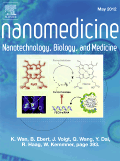
Nanomedicine-Nanotechnology Biology and Medicine
Transforming Biology and Medicine with Nanoscience BreakthroughsNanomedicine-Nanotechnology Biology and Medicine is a leading journal published by Elsevier, dedicated to the exploration of innovative applications of nanotechnology in the fields of biology and medicine. With an ISSN of 1549-9634 and an E-ISSN of 1549-9642, this esteemed journal provides a platform for high-quality research, comprehensively covering areas including bioengineering, biomedical engineering, pharmaceutical science, and nanoscience. Notably, it holds a significant position in various categories with a Q2 ranking in multiple disciplines and a prestigious Q1 ranking in Pharmaceutical Science, emphasizing its impact within the scientific community. By facilitating access to cutting-edge studies and advancements, Nanomedicine-Nanotechnology Biology and Medicine serves as an essential resource for researchers, professionals, and students alike, contributing significantly to the ongoing development of nanomedicine and its pivotal role in improving healthcare outcomes. The journal operates without open access; however, it remains committed to disseminating valuable knowledge to a global audience.
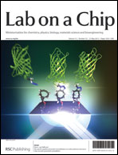
LAB ON A CHIP
Exploring the Future of Biomedical EngineeringLAB ON A CHIP, published by the Royal Society of Chemistry, is a prestigious journal that occupies a pivotal position within the realms of biochemistry, bioengineering, and biomedical engineering. With its ISSN 1473-0197 and E-ISSN 1473-0189, this UK-based journal has been at the forefront of microfluidics and lab-on-a-chip technology since its inception in 2001, consistently contributing to advancements in these dynamic fields. The journal enjoys an impressive reputation, boasting a Q1 ranking in several categories, including Biochemistry and Bioengineering, and maintaining a significant presence reflected through its Scopus rankings. The journal's commitment to innovation and cross-disciplinary research is evident as it bridges chemistry with nanoscale science and technology, making it an essential resource for researchers, professionals, and students seeking to stay abreast of groundbreaking developments. Although it follows a traditional subscription model, its high visibility and accessibility underscore the importance of sharing cutting-edge research findings globally. Recognized as a vital platform for fostering scientific discourse, LAB ON A CHIP continues to play a crucial role in shaping the future of laboratory technology and applications.
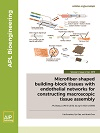
APL Bioengineering
Innovating at the Intersection of Science and MedicineAPL Bioengineering is a premier open-access journal published by AIP Publishing, dedicated to advancing the field of bioengineering and its interdisciplinary applications. Established in 2017, this journal serves as a vital platform for researchers, professionals, and students interested in the critical intersections of bioengineering, biomaterials, biomedical engineering, and biophysics. With an impressive impact factor and consistent rankings in the Q1 category across multiple domains, including biochemistry and materials science, APL Bioengineering has positioned itself among the top journals in its field. The journal aims to publish innovative original research, comprehensive reviews, and insightful case studies that further the understanding and application of bioengineering principles. Since its inception, APL Bioengineering has fostered a community of thought leaders, providing open access to ensure broad dissemination of knowledge and advancements that underpin the future of biomedical innovation.

IEEE Open Journal of Nanotechnology
Bridging Disciplines Through Nanotechnology InsightsIEEE Open Journal of Nanotechnology is an innovative publication dedicated to advancing the field of nanotechnology, with a particular focus on its applications in areas such as computer science, electrical engineering, and materials science. As an esteemed publication of the IEEE (Institute of Electrical and Electronics Engineers), established since 2020, it follows a robust Open Access model, ensuring that high-quality research is accessible to a global audience without financial barriers. This journal is notable for its diverse scope and has rapidly gained recognition, achieving a commendable Q3 ranking across multiple categories, including Computer Science Applications and Materials Chemistry, according to the latest 2023 assessments. With a Scopus ranking that places it among the top journals in the engineering and materials science domains, the IEEE Open Journal of Nanotechnology is positioned as a critical resource for researchers, professionals, and students interested in the cutting-edge developments and methodologies in nanotechnology. The journal promotes interaction and collaboration among scholars and practitioners, making it a vital platform for sharing novel insights and innovations in this rapidly evolving field.
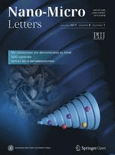
Nano-Micro Letters
Connecting researchers to breakthrough discoveries in nanotechnology.Nano-Micro Letters is a premier open-access journal published by Shanghai Jiao Tong University Press, specializing in groundbreaking research in the fields of Electrical and Electronic Engineering, Nanoscience, and Materials Science. Launched in 2009, this journal has rapidly established its reputation, achieving Q1 ranking across various categories, including Electronic, Optical and Magnetic Materials, and Surfaces, Coatings and Films, indicating its significant impact within the academic community. With an impressive Scopus ranking of #5 out of 797 in Electrical and Electronic Engineering and #2 in Surfaces, Coatings and Films, Nano-Micro Letters serves as a vital platform for disseminating cutting-edge insights and innovations in nanotechnology. Researchers, professionals, and students are encouraged to engage with the open-access content, fostering a collaborative environment that promotes the advancement of knowledge in these dynamic fields.
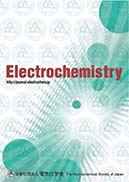
ELECTROCHEMISTRY
Fostering Collaboration in Electrochemical ResearchELECTROCHEMISTRY is an esteemed journal published by the Electrochemical Society of Japan, dedicated to advancing the field of electrochemical science and technology. With an ISSN of 1344-3542 and an E-ISSN of 2186-2451, this journal has been providing a platform for scholarly communication since its inception in 1996, with a converged scope extending to 2024. As an Open Access publication since 2020, it facilitates the wide dissemination of research, fostering collaboration among researchers, professionals, and students alike. Currently positioned in Q3 of the electrochemistry category and ranking 52 out of 60 in Scopus, ELECTROCHEMISTRY is committed to publishing high-quality, peer-reviewed articles that explore novel electrochemical systems, applications, and methodologies. With its base in Tokyo, Japan, the journal serves a global audience, promoting cutting-edge research that drives innovation in energy, materials science, and analytical chemistry.
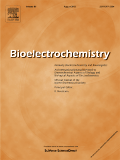
BIOELECTROCHEMISTRY
Elevating Knowledge in Bioelectrochemical StudiesBIOELECTROCHEMISTRY, published by Elsevier Science SA, is a leading academic journal that focuses on cutting-edge research in the fields of biophysics, electrochemistry, and miscellaneous medicine with a commendable impact factor reflecting its significance in the scientific community. Established in 2000 and continuing until 2025, the journal resides in the Netherlands and has been ranked in the Q2 category across various relevant disciplines, such as Biochemistry, Genetics and Molecular Biology, and Physical and Theoretical Chemistry, showcasing its quality and relevance. With a Scopus ranking that places it among the top journals in its categories—including an impressive 12th rank in Electrochemistry—BIOELECTROCHEMISTRY serves as a critical platform for researchers and professionals seeking to disseminate and engage with innovative findings. While the journal does not offer Open Access options, its reputation and reach make it an essential reference point for anyone involved in bioelectrochemical studies. The journal’s commitment to advancing knowledge in electrochemical applications in biological systems ensures its esteemed position in academia.
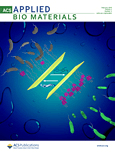
ACS Applied Bio Materials
Advancing Knowledge in Biochemistry and Biomedical EngineeringACS Applied Bio Materials is a leading academic journal published by the American Chemical Society, focusing on the innovative intersection of bioengineering and materials science. Since its inception in 2018, the journal has established itself as a pivotal platform for disseminating impactful research within the fields of Biochemistry, Biomaterials, Biomedical Engineering, and Chemistry, often ranked in the top tiers of these categories. With an impressive impact factor, it holds a Q2 ranking in both Biochemistry and Biomaterials, and a prestigious Q1 ranking in Biomedical Engineering and miscellaneous Chemistry, underscoring its significance in advancing knowledge and practices across these disciplines. The journal’s editorial commitment to high-quality, peer-reviewed research ensures relevance and rigor, appealing to a diverse audience of researchers, professionals, and students keen to explore breakthroughs in bio-related materials technology. The access options enhance its visibility and reach, allowing for a broader dissemination of studies that drive innovation and collaboration in biotechnology and material sciences. Located in the heart of Washington, DC, ACS Applied Bio Materials serves as a crucial resource for advancing the future of healthcare, engineering, and materials research.